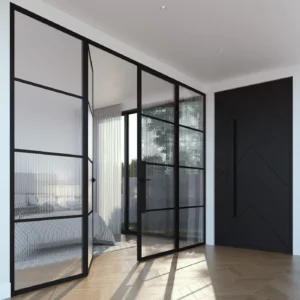Preventing rust on iron doors is essential to maintain their appearance, structural integrity, and longevity.
Here are several preventive measures you can take to minimize the risk of rust:
- Protective Coatings: Apply a protective coating or finish to the surface of the iron door to create a barrier against moisture and corrosion. Common coatings include paint, powder coating, and galvanizing. Choose a coating that is specifically formulated for metal surfaces and suitable for exterior use.
- Regular Maintenance: Inspect the iron door regularly for signs of rust or corrosion, especially in areas prone to moisture buildup or exposure to the elements. Promptly address any areas of rust by cleaning, sanding, and applying touch-up paint or rust inhibitors as needed.
- Keep it Clean: Keep the surface of the iron door clean and free of dirt, debris, and organic matter that can trap moisture and promote rust formation. Regularly wash the door with mild soap and water, and avoid using abrasive cleaners or tools that can scratch the surface.
- Proper Drainage: Ensure proper drainage around the iron door to prevent water from pooling or collecting near the surface. wholesale iron doors Clear debris from drainage channels, gutters, and downspouts to allow water to flow away from the door and prevent moisture buildup.
- Seal Joints and Seams: Seal any joints, seams, or gaps in the iron door frame with a waterproof sealant or caulk to prevent water infiltration. Pay particular attention to areas where different components meet or where the door frame attaches to the wall.
- Ventilation: Ensure adequate ventilation around the iron door to promote airflow and prevent condensation buildup. Proper ventilation helps reduce humidity levels and minimize the risk of moisture-related corrosion.
- Avoid Harsh Chemicals: Avoid using harsh chemicals or abrasive materials on the surface of the iron door, as they can damage the protective coating and promote rust formation. Use gentle cleaning agents and non-abrasive tools to clean the door without compromising its protective finish.
- Regular Inspections: Conduct regular inspections of the iron door to identify any signs of rust, corrosion, or damage early on. Address any issues promptly to prevent them from worsening and spreading to other areas of the door.
- Touch-Up Paint: Periodically touch up any areas of the iron door where the protective coating has been compromised or damaged. Use a rust-inhibiting primer followed by a matching topcoat to protect exposed metal surfaces and prevent further rusting.
By following these preventive measures, you can help prevent rust formation and keep your iron door looking its best for years to come. Regular maintenance and proactive care are key to preserving the appearance and performance of iron doors in various environments.
What security features do iron doors typically have?
Iron doors are often chosen for their robustness and security capabilities.
Here are some common security features that iron doors typically have:
- Solid Construction: Iron doors are usually made from sturdy materials such as wrought iron or steel, iron door manufacturers providing a strong physical barrier against intruders.
- Heavy-duty Hinges and Hardware: Iron doors are typically equipped with heavy-duty hinges and hardware, such as reinforced deadbolts, to enhance security and prevent forced entry.
- Tamper-resistant Design: Iron doors often feature a tamper-resistant design, with welded or reinforced construction to deter unauthorized access and withstand attempted break-ins.
- Integrated Locking Mechanisms: Many iron doors come with integrated locking mechanisms, including multi-point locking systems, to provide enhanced security and prevent the door from being forced open.
- Security Glass: Some iron doors feature security glass panels or inserts to provide visibility while still offering protection against break-ins. These glass panels are often reinforced or laminated to resist impact and shattering.
- Customizable Security Features: Iron doors can be customized with additional security features to meet specific security needs and preferences, such as security bars, grilles, or mesh screens.
- Burglar-resistant Design: Iron doors may incorporate features such as reinforced frames, anti-pry plates, and security screws to make them more resistant to burglary attempts and forced entry.
- Weatherproofing: Iron doors are often designed to be weatherproof, with sealed edges, China iron glass door manufacturers weather-stripping, and corrosion-resistant coatings to prevent moisture infiltration and maintain security integrity over time.
- Fire Resistance: Some iron doors are rated for fire resistance, providing an additional layer of security and protection in the event of a fire emergency.
- Remote Access Control: For added convenience and security, some iron doors can be equipped with remote access control systems, keypad entry, or smart locks that allow homeowners to control access to their property remotely.
Overall, iron doors are valued not only for their aesthetic appeal but also for their strength, durability, and security features, making them a popular choice for residential and commercial properties seeking to enhance security and peace of mind.
